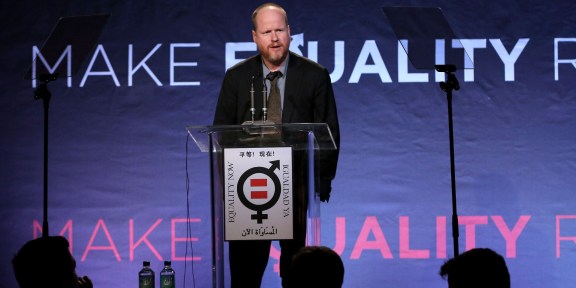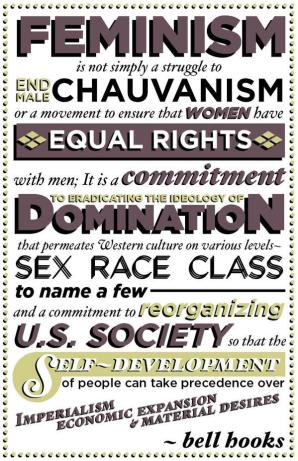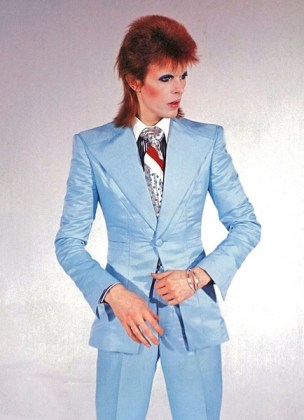In an acceptance speech at Make Equality Reality last week, Joss Whedon pitched an interesting alternative to the word “feminist”: “genderist.” The full 14-minute speech is really worth a watch, but if you can’t (or won’t, it’s cool), here’s the rundown:
- Whedon hates the word “feminist,” though not the idea. His issue stems in part because he dislikes the sound of the syllables, and in part because he feels that “ist” implies a socially constructed idea, which gender equality should not be.
- He brings up Katy Perry not identifying as a feminist while simultaneously embracing feminist ideals, and suggests that it is evidence of words failing her/us.
- Whedon compares this to public discourse about race, pointing out that the word “racist” serves the purpose of shaming people “on the wrong side of history” as well as creating the illusion that the unmarked norm in civil society today is “past” the acceptance of racism.
- Finally, he proposes that we use the term “genderist” as a pejorative (similar to “racist”), in the hopes that this will nudge society’s default position forward from “not a feminist” to “not a genderist.”

Predictably, reactions to Whedon’s speech have been all over the map. (Which, for better or worse, is pretty much the way it always goes down when men voice public opinions on feminism.) On Thursday, Jezebel‘s Katie Dries gushingly characterized the speech as perfect; two days later, HermioneStranger responded on Jezebel Groupthink that Whedon is “actually totally full of crap.” Salon‘s Katie McDonough resolutely rejected Whedon’s proposal that gender equity is a “natural state,” while The Atlantic‘s Noah Berlatsky penned a polemical piece criticizing the speech’s lack of deference to feminist history. There were valid points all around, particularly in the critiques of how Whedon framed the issue.
From my perspective, I thought that what Whedon presented was interesting, well-intentioned, and way off the mark. For starters: I disagree with his conception of what a feminist is. So perhaps it is unsurprising that I also fundamentally disagree with him on why “feminist” is unnecessary and “genderist” is not.
![photo grid of people holding up "I need feminism becauase [reason]" signs](https://develop.autostraddle.com/wp-content/uploads/2013/11/i_need_feminism_because.jpg?resize=512%2C457)
“Genderist,” on the other hand, is a much more passive concept than “feminist,” because it’s a word that you apply to other people. It implies no personal ownership. You can give lip service to “genderist” all day long and sit back, feeling like you’ve already done your duty merely by saying the word aloud. There’s no responsibility on your part to follow up, or to effect any positive change in the world. It’s a minimum effort approach, and given the pervasive sexism throughout our society, I feel like this simply isn’t good enough.

Within Whedon’s original speech, he does address the idea of ongoing struggle. “We will never not be fighting,” he said emphatically. But, “[language] is how we understand society. The word racism didn’t end racism. It contextualized it in a way that we still haven’t done with this issue.”
Really, though – is comparing our language and thinking around gender inequity to language and thinking around racism really accurate? Although the effects of racism and sexism are intersecting and overlapping for many people, that doesn’t mean that their histories are the same, or that the same methodology will end both of them. Whedon’s own work, which often features strong female protagonists but often suffers from misguided “colorblindness” and rarely features people of color, is in fact an example of that. Whedon doesn’t seem like he knows enough about racism or the word ‘racist’ to necessarily be basing entirely new branches of feminism off of it.
Besides, don’t we already have a similarly functioning word with “sexist?” Pithy jokes about ’70s-era powder blue suits aside, what is the actual objection to this word? (Haven’t the ’70s passed yet? Isn’t that what Whedon was going for, a word that evokes a sense of something whose acceptability is behind us?)

In truth, what Whedon is offering with “genderist” is a less loaded term; a softer, prettier descriptor for a really ugly thing. And while I’m sure he didn’t mean it this way (…right?), I feel like it’s a serious misstep for a man to suggest to a group of women that they might make more progress if they would just consider using a less aggressive tone.
“Genderist” is a rhetorical device that lets people off the hook too easily and further marginalizes feminism. Once you start describing things as “genderist” you don’t even need to say the word feminist anymore, much less process how it relates to your life. And that just isn’t a thing I can get behind.
So thanks but no thanks, Joss Whedon. You can keep “genderist” to yourself for now; I’m sticking with feminism.







